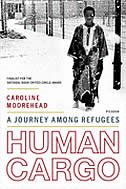Human Cargo
 Human Cargo: A Journey Among Refugees
Human Cargo: A Journey Among RefugeesBy Caroline Moorhead
This book is an intimate look at what it means to be a refugee. Caroline Moorhead shares the stories of dozens of refugees around the world. Their stories are horrific and moving. They have faced persecution, torture, and loss that are unfathomable to those of us lucky enough to be born into privilege.
What I found most compelling about this book is Moorhead’s discussion of immigration policies in western countries, which isn’t something that I’ve ever really given much thought to. The book raises some very tough issues around the morality of exclusionary immigration policies. She explores the ways in which our ideas of national identity are predicated on exclusion – on keeping “others” out. Moorhead certainly doesn’t offer any easy answers, because of course there aren’t any. The issues are complex and difficult – what obligations do we have to intervene in civil wars and domestic conflicts? What obligations do we have to people who are displaced by civil wars and domestic conflicts? How can we repair the legacy of destruction that is being perpetuated in refugee and displaced persons camps?
I really enjoyed this book and it raises some issues that I think we all need to give some thought to. On a personal note, this book planted the seed of an idea that I think may develop into a topic for my master’s thesis.


2 Comments:
Hi, Jessica!
Thank you for this wonderful review! I have had this book sitting on my shelf for the longest time, I really must make time to read it. Refugee and immigrant stories have always intrigued and moved me, my favorites being, "Ministry of Pain" by Dubravka Ugresic and "Enrique's Journey" by Sonia Nazario. Have you read either?
Hi Lotus!
No, I've never read either of those books but I've just added both of them to my "to read" list. Thanks for the recommendations.
Post a Comment
<< Home